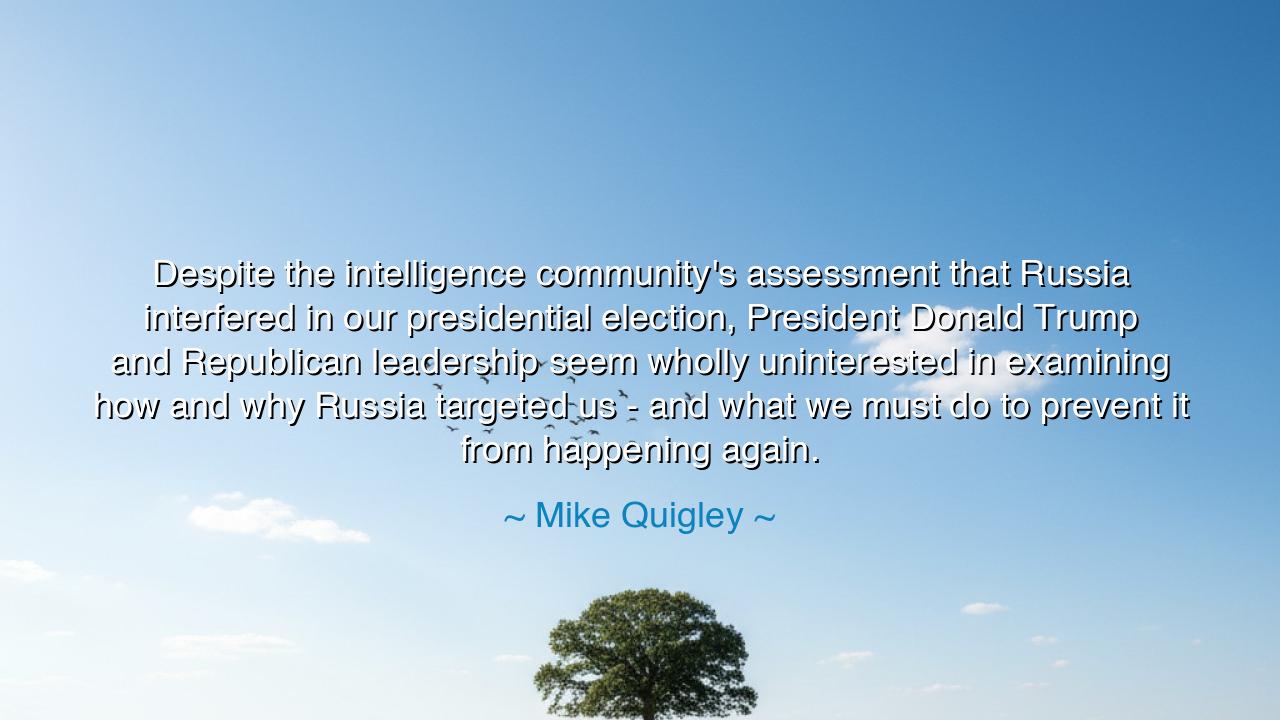
Despite the intelligence community's assessment that Russia
Despite the intelligence community's assessment that Russia interfered in our presidential election, President Donald Trump and Republican leadership seem wholly uninterested in examining how and why Russia targeted us - and what we must do to prevent it from happening again.






When Mike Quigley declared, “Despite the intelligence community’s assessment that Russia interfered in our presidential election, President Donald Trump and Republican leadership seem wholly uninterested in examining how and why Russia targeted us — and what we must do to prevent it from happening again,” he spoke not merely as a politician, but as a guardian of democratic memory. His words are heavy with warning, for they remind us that freedom, when taken for granted, becomes fragile, and that ignorance in the face of danger is the first step toward decline. Like the prophets of old, Quigley’s cry was not born from partisanship, but from the ancient duty to protect truth from decay and complacency.
This quote arose in the aftermath of the 2016 United States presidential election, when America’s intelligence agencies — the CIA, NSA, and FBI — declared that foreign interference had sought to manipulate public opinion and influence the nation’s most sacred act of self-governance: the vote. In that moment, the world saw not armies crossing borders, but something far subtler — the invasion of minds through information. Quigley’s words were spoken as a lament that those entrusted with power, rather than seeking clarity, turned away from inquiry. He warned that the refusal to examine how a democracy had been breached was itself a sign of spiritual weakness — for a nation that does not confront its own vulnerabilities is already halfway conquered.
Throughout history, this story has been told again and again. When Troy fell, it was not the walls that first crumbled, but the vigilance of its people. The Trojan Horse was not a weapon of war, but of deception — an act of manipulation that preyed upon pride and blindness. So too, in Quigley’s warning, the modern Trojan Horse arrives not in wood and bronze, but through the networks of technology and division. His words recall an ancient truth: empires do not collapse by force alone; they fall when they cease to seek truth.
The heart of Quigley’s message lies in his belief that accountability is the lifeblood of democracy. To “examine how and why” is not merely a bureaucratic task — it is an act of moral courage. When leaders refuse reflection, they invite repetition; when they dismiss evidence, they surrender to illusion. This is the shadow that haunts every republic — the slow corrosion of trust, the quiet erosion of vigilance. Quigley’s frustration mirrors that of Cicero, who once warned the Roman Senate that internal apathy would destroy the Republic long before any foreign enemy could. To look away from danger is to participate in one’s own undoing.
Yet his words are not only a condemnation; they are also a summons. For Quigley reminds us that citizenship is not a passive inheritance, but an active calling. The preservation of truth is not the task of governments alone — it belongs to every citizen who asks questions, who demands integrity, who refuses to let comfort blind conscience. Just as the body weakens when it ignores its wounds, a nation decays when it refuses to acknowledge the injuries done to its institutions. His plea is, at its core, an appeal to the intelligence of the people, the true sentinels of democracy.
Consider the example of George Washington, who in his Farewell Address warned against foreign influence and internal division. He knew that freedom cannot survive on strength alone; it requires awareness, self-examination, and unity in truth. Washington’s warning, like Quigley’s, was born of foresight: a recognition that the subtlest threats come not from battlefields, but from minds swayed by deception. The strength of a nation, then, lies not in its armies, but in the clarity of its vision — in its willingness to face uncomfortable truths with courage.
And so, the lesson is this: the health of a democracy depends upon its capacity for honest reflection. When confronted with corruption, with interference, with deceit, we must not look away. To question is not to betray; to investigate is not to divide. Rather, it is to honor the sacred covenant between freedom and truth. Quigley’s words call to all who will listen: do not let apathy become your inheritance. In every age, the enemies of liberty change their form — from swords to signals, from soldiers to screens — but their aim is the same: to make the free forget how to think. Resist this with all the might of your mind. For only those who guard truth with vigilance will inherit the dawn of a free tomorrow.






AAdministratorAdministrator
Welcome, honored guests. Please leave a comment, we will respond soon